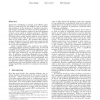Free Online Productivity Tools
i2Speak
i2Symbol
i2OCR
iTex2Img
iWeb2Print
iWeb2Shot
i2Type
iPdf2Split
iPdf2Merge
i2Bopomofo
i2Arabic
i2Style
i2Image
i2PDF
iLatex2Rtf
Sci2ools
135
Voted
EUROPAR
1997
Springer
1997
Springer
Modulo Scheduling with Cache Reuse Information
Instruction scheduling in general, and software pipelining in particular face the di cult task of scheduling operations in the presence of uncertain latencies. The largest contributor to these uncertain latencies is the use of cache memories required to provide adequate memory access speed in modern processors. Scheduling for instruction-level parallel architectures with nonblocking caches usually assigns memory access latency by assuming either that all accesses are cache hits or that all are cache misses. We contend that allowing memory latencies to be set by cache reuse analysis leads to better software pipelining than using either the allhit or all-miss assumption. Using a simple cache reuse model in our modulo scheduling softwarepipelining optimization, we achieved a bene t of 10% improved execution performance over assuming all-cache-hits and we used 18% fewer registers than were required by an all-cache-miss assumption. In addition, we outline re nements to our simple reuse mod...
| Added | 07 Aug 2010 |
| Updated | 07 Aug 2010 |
| Type | Conference |
| Year | 1997 |
| Where | EUROPAR |
| Authors | Chen Ding, Steve Carr, Philip H. Sweany |
Comments (0)

